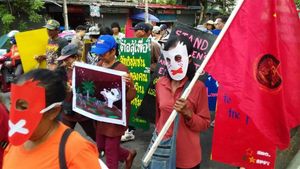China has taken significant steps recently, expelling Tan Ruisong, the former president of the Aviation Industry Corporation of China (AVIC), from the Communist Party over corruption allegations. This event, occurring on February 24, 2024, highlights the continuation of President Xi Jinping's anti-corruption campaign, which has intensified since he assumed power back in 2012.
The Commission for Discipline Inspection (CCDI) found Tan engaged in corrupt practices, stating he had "exploited the military sector for personal gain." The accusations against him detail not just the acceptance of bribes, but also the misuse of his authority to influence business restructurings and project contracts. His actions have reportedly led to severe breaches of trust within the military's leadership and raised concerns about the integrity of state security.
The expulsion of Tan is not isolated; it is part of Xi's broader strategy to root out corruption, particularly within the military ranks. Over the years, thousands of officials have faced punitive measures, with over 610,000 officials being dealt with for corruption-related offenses just last year. Experts suggest this crackdown serves dual purposes: reinforcing loyalty within the Communist Party and eliminating potential threats to Xi's power, especially as he consolidates his leadership.
Alongside the expulsion of Tan, the same day saw the Chinese government publish its annual rural revitalization policy, known as 'Document No. 1.' This document outlines ambitious plans to boost agricultural productivity, ensuring self-sufficiency, and addressing the multi-layered challenges of current economic pressures and climatic changes affecting food security.
With agriculture under pressure, the government aims to reduce dependence on foreign imports by fostering innovation and resilience within the sector. Among the proposals are enhanced rewards and subsidies for key grain-producing regions and advancing the use of biotechnological crops. These reforms are not just intended to bolster food output but are seen as necessary shifts to stimulate rural economies severely impacted by past strategies.
The backdrop for these announcements is the notable rise in China's grain production, which reached 706.5 million metric tons—a 1.6% increase from the previous year. Authorities are hopeful this trend will continue through strategic interventions targeting international trade fluctuations.
The government is also encouraging the integration of advanced agricultural practices, including smart technology and artificial intelligence, aimed at optimizing outputs and making farming more efficient. This push for modernization reflects awareness of global trends and competitive pressures, particularly amid rising tensions with the United States and other nations over trade policies.
Notably, the connection between these two significant events—corruption purges and agricultural revitalization—highlights the overarching goals of the Xi administration. The anti-corruption campaign is seen as both necessary governance and as a power consolidation tool, ensuring loyalty and obedience among officials and military brass, thereby securing the stability of the regime.
While the CCDI's investigations reveal systemic issues within the military and governmental structure, they also indirectly spotlight the urgent agricultural reforms and their long-term significance for rural communities. By addressing corruption, the government aims to restore faith among its citizens and stakeholders, presenting itself as proactive and committed to national interests.
China's dual approach of intensifying anti-corruption measures alongside deepening rural reforms might appear counterintuitive, yet they are symbiotic. By stabilizing the government’s integrity and investing in rural revitalization, the Chinese leadership seeks to cultivate not only economic growth but also political legitimacy.
Moving forward, the effectiveness of these policies hinges upon the government's ability to balance these initiatives. The successes or failures will likely be met with close scrutiny, as the populace watches closely for genuine improvements amid persistent skepticism about the political elite's reform intentions.
Overall, the expulsion of officials like Tan and the renewed focus on rural revitalization reflect both the challenges and strategic directions of the Chinese government as it navigates through internal scrutiny and external pressures.



